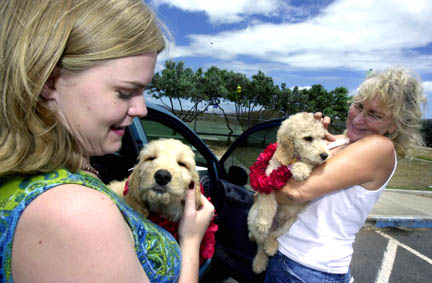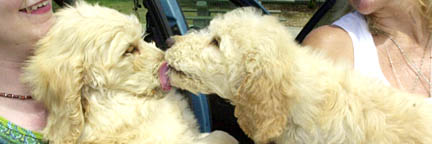
Stephanie Dryden, puppy-raising coordinator for Hawaii Fi-Do Service Dogs, and Susan Lewis, who runs the service, hold two Labradoodle puppies that just arrived from Australia. The dogs, which are a cross between a Labrador and a standard poodle, were donated by Rutland Manor Labradoodles in Australia. The group is at Keehi Lagoon Park, where the dogs finally got to stretch out since they were not allowed out of their containers on airport property.
What do you get when you
breed Labradors with poodles?
Labradoodles
The smart, friendly dogs, which do not
shed, hold promise as future service dogs
in Hawaii
Mate a Labrador with a standard poodle, and what do you get? A top-flight service dog to help people with disabilities.
CORRECTIONS
Tuesday, June 29, 2004>> Susan Luehrs runs Hawaii Fi-Do Service Dogs in Haleiwa. Her last name was misspelled as Lewis in a photo caption on Page A3 in yesterday's paper.
Thursday, July 1, 2004>> Two Labradoodle pups donated to Hawaii Fi-Do Service Dogs in Haleiwa by Australia's Rutland Manor Labradoodle Breeding and Research Center did not result directly from breeding a Labrador and a standard poodle as reported in a Page A3 article on Monday. Those puppies came from a multiple-generation Labradoodle mother.
The Honolulu Star-Bulletin strives to make its news report fair and accurate. If you have a question or comment about news coverage, call Editor Frank Bridgewater at 529-4791 or email him at fbridgewater@starbulletin.com."They are very expensive dogs, a unique type of dog," said Susan Luehrs, who runs Hawaii Fi-Do Service Dogs in Haleiwa. "We hope they will be service dogs."
Two 3-month-old Australian Labradoodles have been donated to Hawaii Fi-Do Service Dogs. They were bred at the Rutland Manor Labradoodle Breeding and Research Center in Darnum Victoria, Australia.
Labradors and golden retrievers have been the preferred breeds for training to assist disabled people, but they shed their fur and many people with disabilities are allergic to it, according to the International Labradoodle Association.
Labradoodles do not shed and have a gentle nature and intelligence that makes them easy to train to assist children, particularly those with autism, and adults with special needs, the association says.
Luehrs said she will work with Paradise Labradoodles on Kauai, which is raising the mixed-breed dogs for therapy with autistic children. She also has been invited to visit Rutland Manor by the woman there who gave her the puppies.
A special-education teacher at Kahuku High and Intermediate School, Luehrs has been working with therapy dogs since 1997. She established her program for service dogs about five years ago after the Lions Club sponsored her training on the mainland.
She said breeders cringe at mixed dogs like the Labradoodles. "But we're not going for show. We going for people to gain independence. A lot of mixed dogs are used. We put them together (with disabled people), and they have a really wonderful dog."
The puppies, which arrived by Hawaiian Airlines Tuesday, are "darling, with cream-colored curly hair, long eyelashes and a nice personality, very mellow," Luehrs said. "They're very sweet dogs."
She is observing them, looking for alertness and sociability, and testing them for retrieval to see if they will pick something up, hold it, walk with it and let her take it out of their mouth.
She said a lot of dogs and people have been visiting since the Labradoodles arrived, and they have done well with the noise.
"I know in Australia they expose them to all the noises and elements, and they're pretty much over the curiosity."
She is not sure yet what category of service dogs they will occupy. "We'll see where they go. You never know with personalities what line of work they'll be good in."
They could be good to help people with hearing alert, mobility or assistance, she said, noting some friends on the mainland with service organizations use them for assistance pulling wheelchairs, helping to retrieve or turn on lights.
She said the dogs will be in her household for a year "learning social manners and basic obedience, being a good dog. They'll be re-evaluated for health, hips and temperament in a year, then we will get more serious."
She said she will take them into the community, probably in August, to get them used to noises and the environment in which they will be living and working as service dogs.
Five certified teams -- dogs and their new owners -- have graduated from her training program, and she is working on three others, she said. "It is not a speedy process, but it is making a little bit of difference."
Kids help her with dog training and socialization at the Life Center in Kahuku. "That's the fun part," she said. They also take service dogs on visits to Kahuku Hospital.

